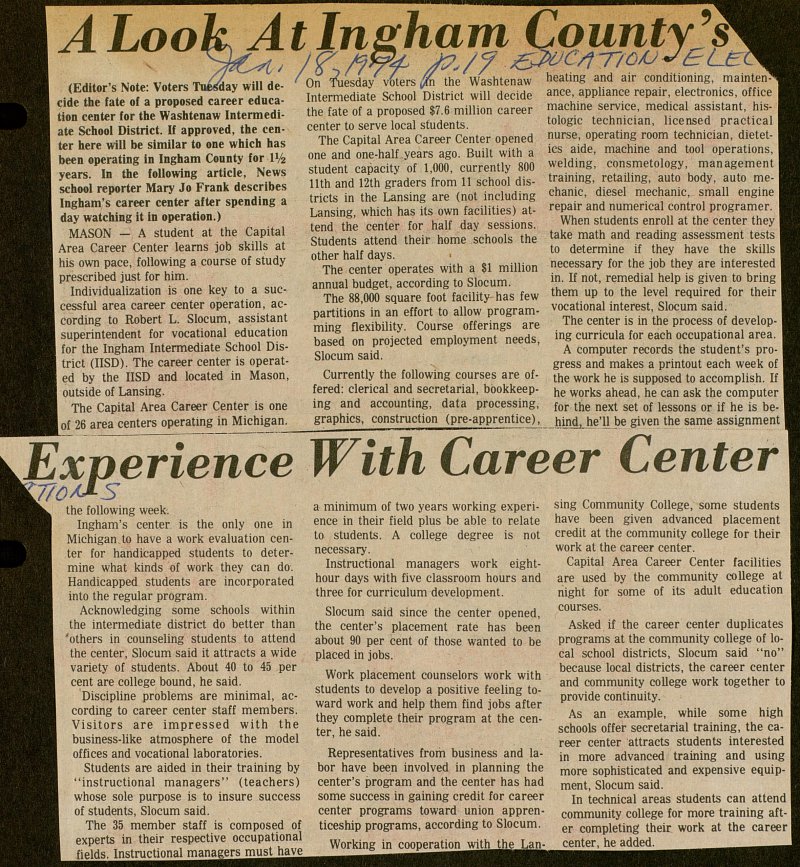A Look At Ingham County?s Experience With Career Center

(Editor's Note: Voters Tntóaay will decide the fate of a proposed career educai tion center for the Washtenaw Intermedíate School District. If approved, the center here will be similar to one which has been operating in Ingham County for 1V2 years. In the following article, News school reporter Mary Jo Frank describes Ingham's career center after spending a I day watching it in operation.) I MASON - A student at the Capital I Area Career Center learns job skills at I his own pace, following a course of study I prescribed just for him. Individualization is one key to a sucI cessful area career center operation, acI cording to Robert L. Slocum, assistant I superintendent for vocational education I for the Ingham Intermedíate School DisI trict (IISD). The career center is operatI ed by the IISD and located in Mason, I outside of Lansing. The Capital Area Career Center is one Inf ?.fi area centers operating in Michigan. 'KW W7 m On Tuesday voters yin the Washtenaw Intermedíate School District will decide the f ate of a proposed $7.6 million career center to serve local students. The Capital Area Career Center opened one and one-half.years ago. Built with a student capacity of 1,000, currently 800 llth and 12th graders from 11 school districts in the Lansing are (not including Lansing, which has its own facilities) attend the center for half day sessions. Students attend their home schools the other half days. The center opérales with a $1 million annual budget, according to Slocum. The 88,000 square foot facility has few partitions in an effort to allow programming flexibility. Course offerings are based on projected employment needs, Slocum said. Currently the following courses are offered: clerical and secretarial, bóokkeeping and accounting, data processing, graphics, construction (pre-apprentice), WCf TOÁJ Lr (-C heating and air conditioning, maintenB anee, appliance repair, electronics, office I machine service, medical assistant, I tologic technician, licensed practical I nurse, operating room technician, 1 ics aide, machine and tooi operations, I weiding, consmetology, management I training, retailing, auto body, auto 1 chanic, diesel mechanic, small engine I repair and numerical control programer. I When students enroll at the center they I take math and reading assessment tests I to determine if they have the skills I necessary for the job they are interested I in. If not, remedial help is given to bring I them up to the level required for their I vocational interest, Slocum said. The center is in the process of 1 ing curricula for each oceupational área. I A computer records the student's 1 gress and makes a printout each week of I the work he is supposed to accomplish. If I he works ahead, he can ask the computer for the next set of lessons or if he is behind, he'U be given the same assignment . the following week. Ingham's center is the only one in Michigan, to have a work evaluation center for handicapped students to deterI mine what kinds of work they can do. Handicapped students are incorporated into the regular program. Acknowledging some schools within the intermediate district do better than 'others in counseling students to attend I the center, Slocum said it attracts a wide variety of students. About 40 to 45 per I cent are college bound, he said. Discipline problems are minimal, acI cording to career center staff members. Visitors are impressed with the business-like atmosphere of the model offices and vocational laboratories. Students are aided in their training by "instructional managers" (teachers) I whose sole purpose is to insure success of students, Slocum said. The 35 member staff is composed of I experts in their respective occupational I fields. Instructional managers must have a minimum of two years working experience in their field plus be able to relate to studente. A college degree is not necessary. Instructional managers work eighthour days with five classroom hours and three for curriculum development. Slocum said since the center opened, the center's placement rate has been about 90 per cent of those wanted to be placed in jobs. Work placement counselors work with students to develop a positive feeling toward work and help them find jobs after they complete their program at the center, he said. Representatives from business and labor have been involved in planning the center's program and the center has had some success in gaining credit for career center programs toward union apprenticeship programs, according to Slocum. Working in cooperation with the sing Community College, some students I have been given advanced placement I credit at the community college for their I work at the career center. Capital Area Career Center facilities I are used by the community college at I night for some of its adult education courses. Asked if the career center duplicates programs at the community college of local school districts, Slocum said "no" because local districts, the career center and community college work together to provide continuity. As an example, while some high schools offer secretarial training, the career center attracts students interested in more advanced training and using more sophisticated and expensive equipment, Slocum said. In technical areas students can attend community college for more training after completing their work at the career center, he added.